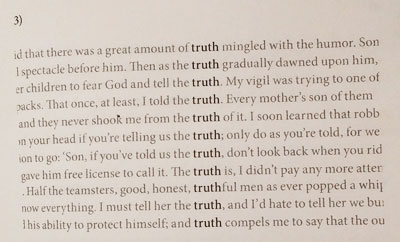he heard snatches of comment
going up from the river bank
all them injuns is people first
and besides for this buckskin
why we even shoot at them
and seems like a sign of warm
dead as a horse friendship
and time to pedal their eyes
to lean out and say the truth3
all you injuns is just white keys

Notes on the Poem
When we last looked at a selection from Jordan Abel's 2017 Griffin Poetry Prize winning collection Injun, we learned more about his powerful use of found poetry. Other techniques contribute to the impact of his work, as he revealed in a recent interview. When Abel spoke with Anna Bowen of the Eden Mills Writers' Festival, he described how one of his strategies for managing and shaping the source materials was inspired by the "cutup method". You can listen to the interview here while you read the rest of our notes. Artist and writer Brion Gysin and author William Burroughs were two early proponents of applying the painterly collage methodology of the cut-up method to words. The following is an interesting description of the effects of the cut up method, taken from this piece on the subject:The best writing seems to be done almost by accident but writers until the cut up method was made explicit -- (all writing is in fact cut ups. I will return to this point)-- had no way to produce the accident of spontaneity. You can not will spontaneity. But you can introduce the unpredictable spontaneous factor with a pair of scissors.To the physical cut-up process, Abel has added a kind of digital cut-up process facilitated by the electronic searches and filtering of he applied to his collected source materials. As well, how he presents the work in performance (as illustrated in the video on this page) could be characterized as a kind of audio cut-up process. Perhaps the title of one of his earlier works, A Place of Scraps is an especially prescient name in terms of the evolution of Abel's process. He has employed it memorably to cast new, unflinching light on, as he terms it, the "antiquated language" of his source materials.
